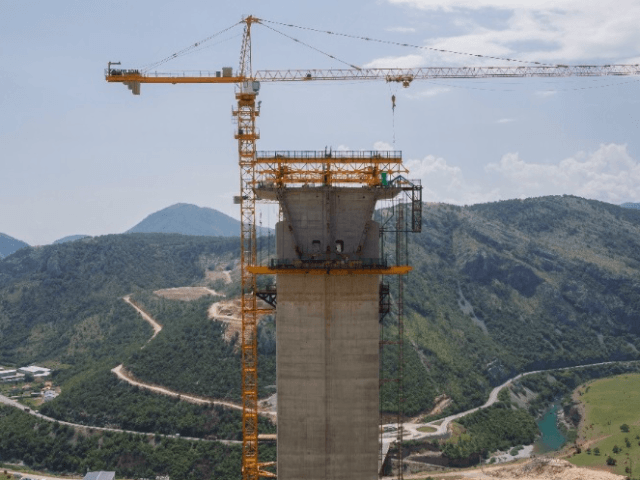Chinese companies are hard at work on building a road through the mountains to connect Montenegro’s port city of Bar with Serbia.
The project is incredibly expensive, leaving Montenegro struggling to pay off titanic debt to Chinese financiers. Critics call it another example of Chinese debt imperialism: the slow-motion conquest of smaller countries through the “Belt and Road” infrastructure initiative by suckering them into taking loans from Beijing they will never be able to repay.
Reuters reported on Monday that the first phase of the project “has sent Montenegro’s debt soaring and forced the government to raise taxes, partially freeze public sector wages and end a benefit for mothers to get its finances in order.”
Even those draconian measures scarcely made a dent in Montenegro’s debt, which now approaches 80 percent of GDP. A European Union official dubbed the Chinese project a “road to nowhere” because it is impossible for Montenegro to borrow enough money to complete construction.
Some Europeans are uneasy to find China’s debt imperialism strategy, so effective in places like Sri Lanka and Djibouti, reaching their doorstep in Montenegro. The Chinese are very good at exploiting local political and cultural trends to sell Belt and Road:
“This highway is a big deal in Montenegro. It reminds people of Tito and the days of grand socialist projects in the region,” said academic Mladen Grgic, referring to former Yugoslavia’s long-time communist leader Josip Broz Tito.
“But it’s a trap. Now that it’s been started, the politicians can’t stop it – no matter how harmful it might be. And frankly they don’t want to,” said Grgic, author of a 2017 study on the highway.
Which means Montenegro has little choice but to seek a “public-private partnership” (PPP) arrangement that will most likely erode its sovereignty further while funneling more money to Chinese interests:
China Road and Bridge Corporation (CRBC), the large state-owned Chinese company that is building the first section, signed a memorandum of understanding (MOU) in March to complete the rest of the road on a PPP basis.
But European lenders worry that Montenegro would need to offer costly revenue guarantees to make that work, potentially deepening its financial woes.
“We told them that their PPP model was not bankable, that they would be taking on risks they don’t know how to manage,” said an official from the European Investment Bank (EIB), the European Union’s lender.
The IMF cautioned the government in May against a PPP solution that could introduce large contingent liabilities. One official suggested Montenegro would be better off waiting until it joined the EU before finishing the highway.
We can only wonder if the Chinese understood that Montenegro would have been better off waiting to join the European Union before launching the incredibly expensive road project, or if they were aware of multiple independent studies showing that the road could never earn enough money to sustain itself without gigantic government subsidies. The road will most likely earn less than a quarter of what it needs to turn a profit.
That is probably why the Export-Import Bank of China commissioned a new feasibility study that both it and the government of Montenegro refuse to disclose, even when the European Union anti-corruption watchdog group MANS demanded to see a copy of it.
“We have no doubt that the data that the ministry of transport used in order to justify the construction of the highway are fabricated,” MANS Deputy Executive Director Dejan Milovac sighed.
It should not have taken a great deal of research to demonstrate that borrowing almost a billion dollars from China for a project where Chinese firms would handle 70 percent of the work was not a great idea for a nation of just 620,000 people. The cost of the project has already swelled a good 20 percent above estimates and is gobbling up a quarter of Montenegro’s GDP.
China is spending about 6 billion euros on Belt and Road infrastructure in the Balkans, much of it in Serbia, which has long been allied with Beijing and defends the Montenegro road as a strategic investment for future growth.
Reuters notes it will certainly be a strategic investment for China, which will gain “a port of entry into Europe from the Adriatic, and close economic and political ties with the government in Podgorica,” which will come in handy if Montenegro joins the European Union.
“It puts the Chinese in a very, very comfortable position,” as a Montenegran opposition leader put it.

COMMENTS
Please let us know if you're having issues with commenting.